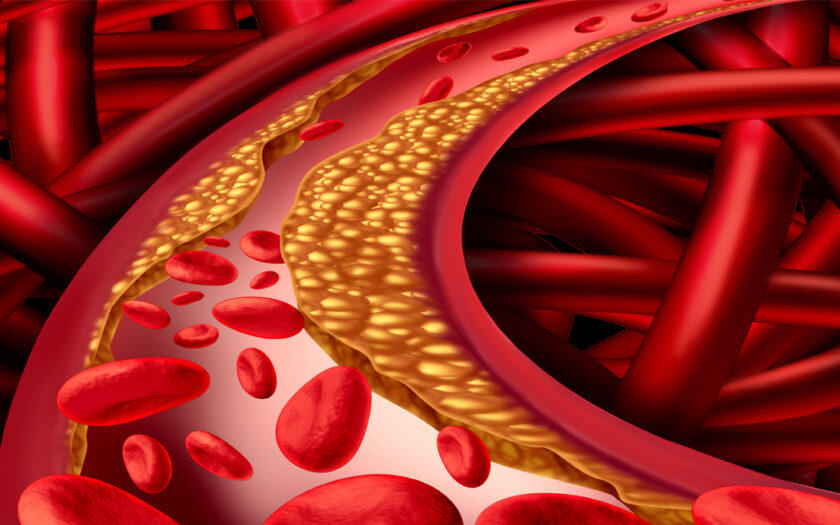Cholesterol is a waxy, fat-like substance that is found in the cells of the body and is essential for various physiological functions. It is produced by the liver and can also be obtained from dietary sources, primarily animal-based foods such as meat, eggs, and dairy products.
Main functions of cholesterol
Cholesterol is an important component of cell membranes, along with phospholipids and proteins. It is embedded in phospholipid bilayers, forming structural domains that provide membranes with stability, strength, and elasticity.
Thanks to cholesterol, cell membranes are able to maintain a certain fluidity and elasticity, which is necessary for many cellular processes, including signal transmission and nutrient absorption. Other functions of cholesterol:
- hormone production. Cholesterol is a precursor to many biologically active substances, including steroid hormones such as estrogens, testosterone, progesterone, cortisol and aldosterone. These hormones play a key role in the regulation of many processes in the body, such as reproduction, metabolism, stress response and regulation of water and electrolyte balance;
- synthesis of bile acids. Cholesterol is the main precursor of bile acids, which are synthesized in the liver and released into the intestines to participate in digestion and absorption of fats. Bile acids help break down fats into tiny particles, facilitating their absorption by the intestines;
- insulating function. Cholesterol also plays a role in the formation of myelin sheaths around nerve fibers. Myelin is a layer of fats and proteins that provides electrical insulation to the axons of nerve cells. This ensures the effective transmission of electrical signals along nerve fibers, which is necessary for the normal functioning of the nervous system.
Although cholesterol performs these important functions, excess levels of “bad” cholesterol (LDL) in the blood may be associated with the risk of cardiovascular disease. Therefore, it is important to strive for a healthy cholesterol balance and maintain it at optimal levels to maintain overall health.
What types of cholesterol are there?
Cholesterol in the blood is carried by different types of lipoproteins, which can be classified according to their density and function. The main types of cholesterol include:
- LDL (low density lipoprotein). Known as “bad” cholesterol, LDL carries cholesterol from the liver to other tissues. Excess levels of LDL can lead to a buildup of cholesterol in artery walls, which can contribute to plaque formation and atherosclerosis, increasing the risk of heart disease;
- HDL (high density lipoprotein). Known as “good” cholesterol, HDL carries cholesterol back to the liver to be metabolized or eliminated from the body. They have a protective role as they help remove excess cholesterol from the arteries, which reduces the risk of cardiovascular disease;
- triglycerides. It is a form of fat that can also be carried in the blood along with lipoproteins. High triglyceride levels may also be associated with an increased risk of heart disease.
These different types of cholesterol affect a person’s overall lipid profile and can be assessed through blood tests such as total cholesterol, LDL, HDL and triglycerides. It is important to strive to maintain a balance between “good” and “bad” cholesterol to maintain heart and vascular health.
Causes of high cholesterol
Elevated levels of cholesterol in the blood, especially “bad” cholesterol (LDL), can be caused by various factors. Some of the main causes of high cholesterol include:
- unbalanced diet. Eating foods high in saturated fat and cholesterol, such as fatty meats, oil, butter, full-fat dairy products, and trans fats (such as in cookies, cakes, fast food), can lead to elevated cholesterol levels;
- lack of physical activity. A sedentary lifestyle can lower your good cholesterol (HDL) and increase your bad cholesterol (LDL);
- genetic factors. Some people may have a genetic predisposition to high cholesterol levels, which can lead to problems with lipid metabolism and cholesterol metabolism;
- obesity. Overweight and obesity may be associated with elevated cholesterol levels, especially triglycerides;
- smoking. Smoking tobacco may increase levels of “bad” cholesterol (LDL) and increase the risk of heart disease
- diabetes. People with diabetes have an increased risk of developing atherosclerosis and cardiovascular disease, which can lead to elevated cholesterol levels;
- aging. Elevated cholesterol levels are often associated with age because the metabolism and distribution of cholesterol in the body can change over time.
It is important to consider that high cholesterol usually does not show obvious symptoms and can only be detected through blood tests. If you are at risk of developing high cholesterol, you should check your cholesterol levels regularly and take steps to keep them at optimal levels, including a healthy diet, physical activity and, if necessary, medication under the supervision of a doctor.
How to determine the cause of high cholesterol?
High cholesterol can be caused by a variety of factors, including genetics, lifestyle, diet and health conditions. To determine the cause of high cholesterol, a doctor may conduct a thorough review of the patient’s medical history, including risk factors such as family medical history, lifestyle and habits, and may also perform various laboratory tests such as total cholesterol, LDL, HDL and triglycerides. Sometimes genetic testing may be needed to identify inherited factors that contribute to high cholesterol.
To assess the condition of the blood vessels and determine the presence of atherosclerosis, the doctor may prescribe an ultrasound examination of the blood vessels. This allows the arteries to be visualized and assessed for plaque or stenosis that may be associated with high cholesterol. An abdominal ultrasound may also be ordered to evaluate the condition of the liver and gallbladder, especially if gallstones or fatty liver disease are suspected.
How does diet affect cholesterol levels?
Diet plays a significant role in influencing cholesterol levels, as certain dietary components can either raise or lower cholesterol levels in the blood. Here’s how diet can affect cholesterol levels:
- Saturated and trans fats. Foods high in saturated and trans fats, such as red meat, full-fat dairy products, fried foods, and baked goods, can raise LDL (bad) cholesterol levels. These fats are often solid at room temperature and can contribute to the buildup of plaque in the arteries, increasing the risk of heart disease.
- Dietary cholesterol. While dietary cholesterol from sources like eggs, shellfish, and organ meats can modestly raise LDL cholesterol levels in some individuals, it generally has less of an impact on cholesterol levels compared to saturated and trans fats.
- Soluble fiber. Foods high in soluble fiber, such as oats, beans, lentils, fruits, and vegetables, can help lower LDL cholesterol levels by binding to cholesterol in the digestive tract and promoting its excretion from the body.
- Unsaturated fats. Foods rich in unsaturated fats, including olive oil, avocados, nuts, and seeds, can help lower LDL cholesterol levels when consumed in place of saturated and trans fats. They may also help raise HDL (good) cholesterol levels.
- Omega-3 fatty acids. Sources of omega-3 fatty acids, such as fatty fish (e.g., salmon, mackerel, sardines), flaxseeds, chia seeds, and walnuts, can help lower triglyceride levels and may also have a modest effect on lowering LDL cholesterol levels.
- Plant sterols and stanols. Plant sterols and stanols, found naturally in small amounts in fruits, vegetables, nuts, seeds, and whole grains, can help lower LDL cholesterol levels when consumed in higher amounts as part of a balanced diet. They work by blocking the absorption of cholesterol in the intestines.
- Weight management. Maintaining a healthy weight through a balanced diet and regular physical activity can help improve cholesterol levels, as excess body weight, particularly excess abdominal fat, can contribute to higher LDL cholesterol levels and lower HDL cholesterol levels.
Overall, adopting a heart-healthy diet that is low in saturated and trans fats, rich in fruits, vegetables, whole grains, lean proteins, and healthy fats, can help promote optimal cholesterol levels and reduce the risk of heart disease. Additionally, incorporating regular physical activity, maintaining a healthy weight, and avoiding smoking are essential components of a heart-healthy lifestyle.



